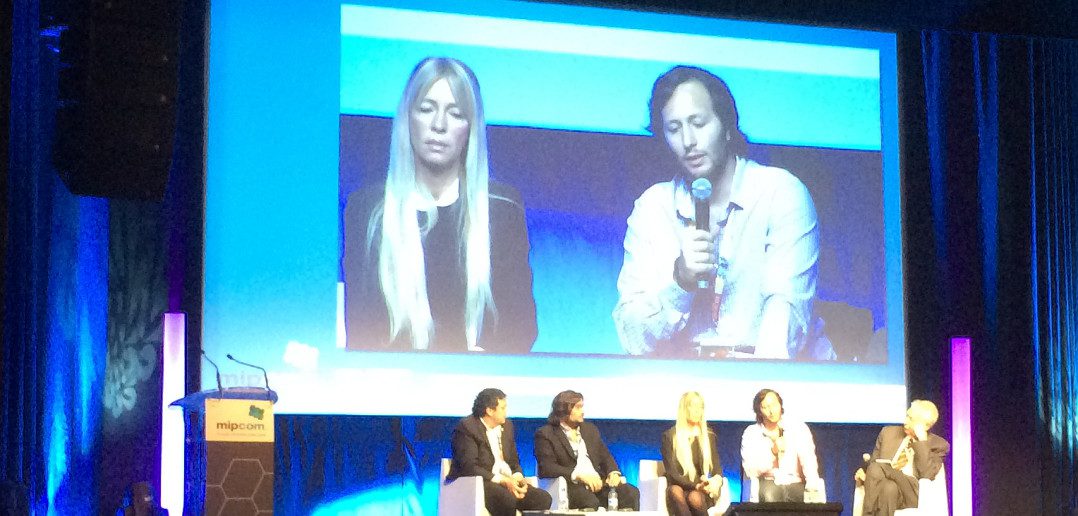This year’s Country of Honour at MIPCOM is Argentina, with the week set to provide a showcase for its vibrant television formats and digital creativity.
This morning at MIPCOM, four senior execs from the Argentinian industry came together for a panel session to discuss trends and partnerships in their home country. They were (l-r): Tristán Bauer, president of Radio y Televisión Argentina; Martin Kweller, CEO & chairman at Endemol Argentina; Cris Morena, producer & CEO at Cris Morena Group; and Tomás Yankelevich, global content director at Telefe.
They provided insights on a TV market that’s estimated to be worth $5.5bn already. The session moderator was Miguel Smirnoff, CEO of Editorial Prensario. He started by asking Bauer how public television is evolving in Argentina.
“Television as a whole in Argentina is in a very positive, strong and healthy situation. There is a great expansion and great quality of our television,” he said, noting that public television was launched 60 years ago there, and that it has seen an “exceptional growth in development” in the last five years.
“It has been developing a lot, and we have had long feature films, and also collaborations with Spanish channels in terms of long features. And we also have co-production going on… We’re always very concerned about quality. And we have had a very strong development going on in the last five years around web and social networks… We have to try to keep together not only the more traditional formats of our television, but also develop for new things.”
Kweller next, to answer a question about co-production in Argentina. He said that it’s a very strong time: since 2001, when Endemol started working on co-productions, one of its main strategies has been to expand at a global level, and show the strength and quality of Argentinian formats and productions.
“We went for the world, and produced more than 1,000 hours for more than 42 countries around the world, and 32 countries of Endemol came and produced in Argentina,” he said. “We are also developing formats that are travelling. It’s a great moment to go on co-producing. We have experience, more than 150 producers, bi-lingual, ready to receive productions around the world.”
Smirnoff turned to producer Moreno next, to explain the success of her productions for children and teenagers. She said that when her company starts working on a new show: “I have to make sure my soul, my body and my mind know what is going on. And I have to be very passionate to develop this project, and transmit my passion to the public,” she said.
Moreno said she’s looking for “audacious” products for children and young people: “they are the ones who will write these stories tomorrow, and these stories have to be disseminated throughout the world. So I work in a different way to companies: I start with the content, and then I work on deals.”
Smirnoff then turned to network Telefe’s Tomás Yankelevich with a question on selling Argentinian formats to the world, since it’s producing shows as well as screening them. “There isn’t a specific content that would only be fitted to Argentina. We have to make sure that we have content that can also be exported, which can develop outside Argentina,” he said.
“We have to think in terms of universal content, global content… We do not want to root what we’re doing only in Argentina.” Telefe is looking for more co-productions currently, including working with companies in the US.
Bauer talked about the impact digital TV has been having in Argentina, including strong growth for a children’s channel called Pakapaka focused on animation content, as well as opportunities around music, film and other kinds of production. “This is why Argentina today has the possibility of developing new small and medium-sized companies,” he said.
Morena talked about developing formats and adapting them for other Latin American countries, and said her company is being very active in ensuring the formats are exported. “The message I want to deliver today is if you really want to have a product going beyond your borders, this product is something that has to reflect your passion and your dreams.”
What’s next for broadcast television in Argentina? Yankelevich gave his views, talking about the importance of the web. “It’s very difficult to make sure that this new approach will receive financial support and will have a return on investment,” he said. “But we want to develop this, because we believe that the future lies there.” And he reminded the audience that traditional broadcasting won’t disappear due to the web, any more than radio disappeared when broadcast TV came along.
“With the web you’ll be able to find new viewers,” he said. “We decided that we’d face up to the challenge of new content. Even if we have the web, new mobile formats and other technologies, we will keep with television broadcasting… We want to make sure we’re not too conventional though. We have to be more innovative for the viewers. And we want to have more interconnectivity as well.”
Kweller was asked for his advice for startups and individuals new to the television industry in Argentina. “I would really insist on the fact that you have to get trained,” he said. “You really have to train, to work hard, you have to make sure you have all the capacities that are required. It’s not because you love television that you’re going to be successful. You have to have all the capacities for the business… and make sure you know what television is all about.”
Then Morena talked about her company’s latest show, which is airing on TV, but on the web first. “I was very attracted by these new possibilities. I don’t really know how to handle these new technological tools, but for young companies who are familiar with these technologies, they have to develop these projects using them,” she said. “The web is a new target, especially if you want to work with young producers and young people.”
Morena said that despite airing first online, the show still got healthy ratings on TV: the dual-broadcasting strategy energised the production and team, rather than causing difficulties. “The web enables us to show different episodes, but it also acts as a channel,” she said.




